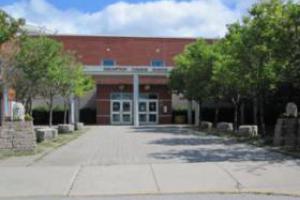Course Level Descriptions
Introduction
The types of courses offered, and their organization provide for a graduated streaming of courses in Grades 9 to 12, which will keep options open for all students in the earlier grades and prepare students in senior grades for their future destination. In Grades 9 and 10, five types of courses are offered: academic, destreamed, applied, locally developed and open. Courses in Grades 11 and 12 are designed to prepare students for a post-secondary destination ─ that is, for apprenticeship training, college, university, or the workplace.
Types of Courses- Grades 9
Students with their parents and teachers choose Grades 9 courses based primarily on student interests, needs and achievements. Students are not required to make binding decisions about a particular educational and career path.
De-streamed Courses
De-streamed Courses ("W"/"D"), or core courses, include a combination of applied and academic theories and skills. This type of programming allows students to further mature and know themseleves better, before they choose the pathway that is best suited for their skills and interests in grades 10-12.
Locally Developed Courses
Locally Developed Courses ("L"), focus on the knowledge and skills that students need to be well prepared for success in the Grade 11 Workplace Preparation courses. Students with widely ranging levels of competency may require these courses; these students may be four years behind grade level with significant gaps in knowledge, concept understanding, and skills. As well, Locally Developed courses will support students in developing and enhancing strategies that they need to develop literacy and numeracy skills and the confidence to use these skills in their day-to-day activities.
Open Courses
Open Courses “O” Open courses comprise a set of expectations that are appropriate for all students. They are designed to prepare students for further study in a subject, and to enrich their education generally.
Types of Courses- Grade 10
In addition to open and locally developed courses, students can now select applied and acadmic courses. With parents, teachers and guidance counsellors students can select an appropriate combination in order to add to their knowledge and skill base, explore their interests, and determine the type of educational program that they are best suited to take.
Academic Courses
Academic Courses (“D”) develop students’ knowledge and skills through the study of theory and abstract problems. These courses focus on the essential concepts of a subject and explore related concepts as well. They incorporate practical applications as appropriate.
Applied Courses
Applied Courses (“P”) focus on the essential concepts of a subject and develop students’ knowledge and skills through practical applications and concrete examples. Familiar situations are used to illustrate ideas, and students are given more opportunities to experience hands-on applications of the concepts and theories they study.
Types of Courses-Grades 11 and 12
In Grades 11 and 12, students will choose from among four destination-related course types: university preparation, university/college preparation, college preparation, and workplace preparation. Some open courses are also offered in Grades 11 and 12. Students will make their choices based on their interests, achievement, and career goals. Prerequisites are specified for many of the courses offered in Grades 11 and 12 (as identified in the Ontario Curriculum documents).
University Courses
University preparation courses ("U"), are designed to equip students with the knowledge and skills they need to meet the entrance requirements for university programs.
University/College Courses- Mixed
University/college preparation courses ("M"), are designed to equip students with the knowledge and skills they need to meet the entrance requirements for specific programs offered at universities and colleges.
College Courses
College preparation courses ("C"), are designed to equip students with the knowledge and skills they need to meet the requirements for entrance to most college programs or for admission to apprenticeship or other training programs.
Workplace Courses
Workplace preparation courses ("E"), are essential as they are designed to equip students with the knowledge and skills they need to meet the expectations of employers, if they plan to enter the workplace directly after graduation, or the requirements for admission to certain apprenticeship or other training programs.
Open Courses
Open courses ("O"), are designed to broaden students’ knowledge and skills in subjects that reflect their interests and to prepare them for active and rewarding participation in society. They are not designed with the specific requirements of universities, colleges, or the workplace in mind.







